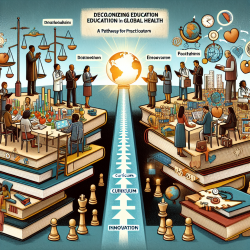The field of global health is at a critical juncture where traditional paradigms are being challenged and redefined. The "Introduction to Special Collection on Decolonizing Education in Global Health" emphasizes the necessity for deep reform across leadership structures, priority setting processes, and educational curricula. This blog post explores how practitioners can leverage these insights to enhance their professional skills and contribute to a more equitable global health landscape.
The Need for Decolonization in Global Health
The decolonization of global health involves a critical analysis of power dynamics that have historically shaped the field. As highlighted in the Special Collection, entrenched power asymmetries continue to influence whose voices are heard and which knowledge systems are valued. Practitioners must engage with these dynamics to foster an inclusive environment that respects diverse perspectives.
Shifts in Leadership Structures
A key outcome from the Special Collection is the call for shifts in leadership structures within global health institutions. Practitioners can advocate for leadership models that prioritize diversity and inclusivity. By supporting leaders from underrepresented backgrounds, practitioners can help dismantle hierarchical systems that perpetuate colonial legacies.
Cognitive Paradigms and Knowledge Systems
The collection also underscores the importance of recognizing and valuing diverse cognitive paradigms. Practitioners should strive to incorporate indigenous knowledge systems into their practice, acknowledging their validity alongside Western scientific methods. This approach not only enriches the field but also empowers communities that have been historically marginalized.
Curriculum Innovation: A Practitioner’s Role
Curriculum innovation is essential for decolonizing global health education. Practitioners can play a pivotal role by advocating for curricula that reflect diverse perspectives and address structural inequities. This involves integrating case studies from various cultural contexts and encouraging critical reflection on the impact of colonialism in health practices.
- Diverse Reading Lists: Encourage the inclusion of literature from authors across different geographies.
- Reflective Exercises: Implement activities that prompt students to consider their positionality within global health dynamics.
- Collaborative Learning: Foster partnerships between institutions in high-income and low-income countries to facilitate mutual learning.
The Role of Practitioners in Policy Change
The Special Collection highlights the need for policy changes that support decolonization efforts. Practitioners can influence policy by participating in advocacy groups and contributing to policy discussions that prioritize equity and justice in global health practices.
Cultivating Equitable Partnerships
An essential aspect of decolonization is creating equitable international partnerships. Practitioners should ensure that collaborations are mutually beneficial and respect the autonomy of all parties involved. This requires transparent communication and shared decision-making processes.
A Call to Action: Further Research and Engagement
The process of decolonizing global health is ongoing and requires continuous engagement from practitioners. Further research is needed to explore innovative approaches to dismantling colonial structures within the field. Practitioners are encouraged to delve deeper into the themes presented in the Special Collection and contribute to this evolving discourse.
Introduction to Special Collection on Decolonizing Education in Global Health










